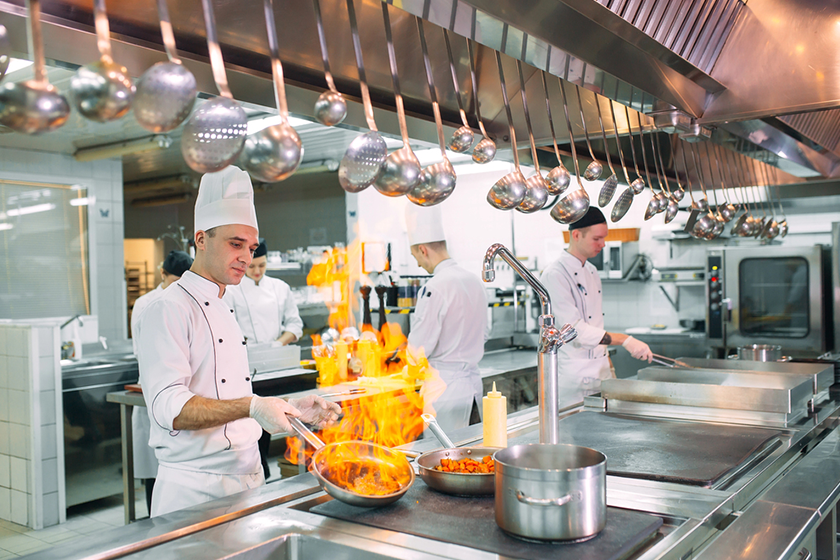5 Common Fire Hazards You Can’t Ignore In Commercial Kitchens

Commercial kitchens are fast-paced environments that require meticulous attention to safety protocols. Among the most critical concerns are kitchen fire hazards, which, if overlooked, can lead to devastating consequences.
From the buildup of grease to the presence of open flames, these hazards are an ever-present threat in any busy kitchen. Understanding and addressing these risks is not just a regulatory necessity but a moral obligation to ensure the safety of staff, customers, and property.
The Danger of Kitchen Grease
In every commercial kitchen, grease accumulation is an inevitable byproduct of daily cooking activities. While often overlooked, this substance poses one of the most significant fire risks. Grease can build up rapidly on various surfaces, including hoods, vents, and cooking appliances. When subjected to high temperatures, this grease can ignite with alarming ease.
Ignoring this hazard is not an option, as the consequences can be catastrophic. A small flame or a spark is all it takes to set off a fire that spreads rapidly through the kitchen. The risk of spontaneous combustion from grease buildup is a reality that many kitchen operators have faced, often with dire results.
To mitigate this risk, it’s essential to establish a stringent cleaning schedule. Regularly cleaning grease traps and ensuring that grease filters are inspected and cleaned at least quarterly in high-volume kitchens—and biannually in others—can significantly reduce the likelihood of a grease fire.
Moreover, educating staff about the dangers of grease accumulation and proper cleaning techniques is a proactive step toward safety.
Faulty Electrical Wiring: A Silent Threat
Electrical systems are the backbone of any commercial kitchen, powering everything from ovens to refrigerators. However, faulty electrical wiring is a silent yet potent fire hazard that demands vigilant attention. The sheer volume of electrical appliances in use increases the risk of wiring issues, which can lead to overheating and fires.
The dangers associated with faulty wiring are multifaceted. Frayed or damaged wires can spark unexpectedly, while overloaded outlets can overheat and ignite nearby materials. Regular inspection of all electrical wiring and appliances is crucial to preventing these incidents.
It’s important to check for visible damage and ensure that wiring is up to code and capable of handling the electrical load. Additionally, avoid running cords under rugs or mats, as this can cause wear and tear that goes unnoticed until it’s too late.
Investing in high-quality fire alarm systems and services can provide an added layer of protection, offering early detection of electrical fires and minimizing potential damage.
Open Flames: Necessary but Risky
Open flames are an inherent part of cooking in commercial kitchens, from stovetops to grills. While they are essential for preparing food, they also present a clear and present danger. The risk of an open flame causing a fire is exacerbated by the presence of flammable materials, such as oil and paper products, which are often found in close proximity to cooking areas.
The risks associated with open flames are not limited to the flames themselves. Loose clothing, kitchen towels, and other flammable materials can easily catch fire if they come into contact with a burner or grill.
Moreover, in a busy kitchen, where multiple open flames are in use simultaneously, the potential for accidents increases significantly. To mitigate these risks, it’s vital to train staff on the proper handling of open flames and the use of fire suppression systems.
Ensuring that flammable materials are stored safely away from cooking areas is another critical step in reducing the likelihood of a fire. The integration of robust fire alarm systems can provide early warnings, giving staff the precious seconds needed to act before a minor incident becomes a full-blown disaster.
Kitchen Clutter: More Than Just a Nuisance
A cluttered kitchen is more than just an eyesore; it’s a fire hazard waiting to happen. The presence of boxes, bags, and other materials can obstruct movement and serve as fuel for fires. In a busy kitchen, where efficiency is key, clutter can also hinder the safe and swift evacuation of staff and patrons in an emergency.
The risks associated with kitchen clutter are twofold. First, clutter can block exits and pathways, making it difficult for individuals to escape in the event of a fire. Second, it can increase the chances of accidental ignition, especially when flammable materials are stored near hot surfaces or open flames.
To minimize these risks, it’s essential to implement a strict organization and cleaning protocol. Keeping pathways clear and disposing of unnecessary items promptly can significantly reduce the fire hazard posed by clutter.
Additionally, incorporating emergency management and services into your safety plan can ensure that your kitchen is prepared to handle any situation that arises.
Overcrowding: Too Many Cooks in the Kitchen
The saying “too many cooks spoil the broth” holds a kernel of truth, especially when it comes to kitchen safety. Overcrowding in a commercial kitchen can lead to chaos and increase the risk of accidents, including fires.
When too many people are working in close quarters, the likelihood of someone accidentally knocking over a pot, spilling flammable liquids, or coming into contact with an open flame increases.
Overcrowding also complicates evacuation procedures in an emergency. In a fire situation, every second counts, and a crowded kitchen can delay the swift exit needed to ensure everyone’s safety. To combat this issue, it’s crucial to establish a maximum capacity for kitchen staff based on the size and layout of the kitchen.
Ensuring that only essential personnel are present during peak hours can help maintain a safer working environment. Regular fire drills and emergency management planning can further enhance preparedness, ensuring that all staff members know their roles and responsibilities in the event of a fire.
Safeguarding Your Commercial Kitchen
Addressing these common kitchen fire hazards is vital for maintaining a safe and efficient commercial kitchen. Regular training, maintenance, and adherence to safety protocols are not just best practices—they are essential to protecting lives and property.
You can significantly reduce the risk of fire incidents by taking proactive measures, such as investing in fire alarm services, keeping the kitchen clean and organized, and ensuring that staff are well-trained in fire safety procedures.
At Fire Safety Alarms, we understand the unique challenges that come with maintaining safety in a commercial kitchen. Our team is dedicated to providing top-tier fire protection services, including fire alarm systems, emergency management, and ongoing support. With over four decades of experience, we have the expertise to help you create a safer kitchen environment.
